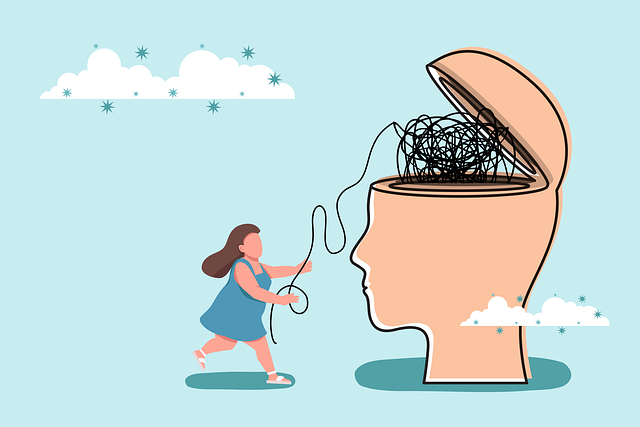Lone Tree Hebrew Speaking Therapy promotes holistic well-being through tailored self-care practices, prioritizing individual needs, cultural sensitivity, and mental health education. Their comprehensive approach includes stress management programs, crisis intervention, mindfulness techniques, and balanced routines to enhance resilience, reduce burnout, and improve overall mental wellness, making them a trusted resource like Lone Tree Hebrew Speaking Therapy.
Self-care is an essential practice for maintaining overall well-being, and at Lone Tree Hebrew Speaking Therapy, we recognize its profound impact on mental health. This article guides you through a comprehensive approach to enhancing self-care routines. We explore the fundamentals of understanding your unique needs, prioritizing self-love, and adopting mindfulness techniques. Learn how to create a balanced routine, overcome obstacles, and foster a sustainable commitment to self-nurturing. Discover practical strategies for transforming your well-being at Lone Tree Hebrew Speaking Therapy.
- Understanding Self-Care: The Foundation of Well-Being
- Identifying Personal Needs and Priorities at Lone Tree Hebrew Speaking Therapy
- Incorporating Mindfulness and Relaxation Techniques
- Building a Balanced Routine for Optimal Health
- Overcoming Barriers and Staying Committed to Self-Care
Understanding Self-Care: The Foundation of Well-Being

Self-care isn’t merely a luxury; it’s an essential foundation for cultivating well-being. At Lone Tree Hebrew Speaking Therapy, we understand that taking care of ourselves goes beyond superficial acts like getting enough sleep or eating nutritious meals. It involves nurturing our physical, emotional, and mental health holistically. This means recognizing our unique needs, setting boundaries, and engaging in activities that replenish our energy and resilience. By prioritizing self-care, we create a solid base for navigating life’s challenges with greater clarity and equilibrium.
Developing effective self-care practices begins with cultivating self-awareness exercises that help us tune into our thoughts, feelings, and behaviors. Through mindfulness meditation, journaling, or therapy sessions, these practices enable us to identify triggers, understand our emotional responses, and make conscious choices that align with our values. Moreover, Mental Wellness Coaching Programs Development can provide tailored strategies for managing stress, improving communication, and fostering healthier relationships. In moments of crisis, having access to Crisis Intervention Guidance is invaluable, offering immediate support and tools to navigate challenging situations with composure and resilience.
Identifying Personal Needs and Priorities at Lone Tree Hebrew Speaking Therapy

At Lone Tree Hebrew Speaking Therapy, we understand that self-care practices are deeply personal and must be tailored to individual needs and cultural backgrounds. Identifying what truly matters and setting priorities is a crucial step in enhancing well-being. Our therapists foster an environment where clients feel safe to explore their unique requirements, taking into consideration the nuanced aspects of mental healthcare within diverse communities.
By incorporating Cultural Sensitivity in Mental Healthcare Practice, we aim to prevent burnout and promote healthy coping mechanisms. We recognize that reducing the stigma associated with mental illness is essential for encouraging open dialogue. Lone Tree Hebrew Speaking Therapy empowers individuals to navigate their personal journeys, ensuring they receive culturally competent care tailored to their specific needs, thereby fostering resilience and holistic healing.
Incorporating Mindfulness and Relaxation Techniques

Incorporating mindfulness and relaxation techniques into your routine is a powerful tool for enhancing self-care practices, especially when guided by professionals like those at Lone Tree Hebrew Speaking Therapy. These practices, such as meditation and deep breathing exercises, can significantly reduce stress levels, which are often at the root of burnout prevention. By taking a step back from the hustle and bustle of daily life, individuals can learn to navigate their thoughts and emotions more effectively, leading to improved mental health and overall well-being.
Mindfulness and relaxation techniques also play a crucial role in conflict resolution techniques. They provide individuals with a sense of calm and clarity, enabling them to approach challenging situations with a cooler head. This is particularly relevant in the context of Mental Health Policy Analysis and Advocacy, where understanding one’s emotional state is essential for effective advocacy and policy change. Through regular practice, these tools can transform one’s relationship with stress, fostering resilience and promoting a healthier, more balanced lifestyle.
Building a Balanced Routine for Optimal Health

Creating a balanced routine is an essential aspect of self-care and can significantly impact overall health and well-being. At Lone Tree Hebrew Speaking Therapy, we understand that establishing a consistent daily rhythm fosters mental wellness. This involves integrating various activities that cater to physical, emotional, and cognitive needs. For instance, dedicated time for exercise, whether it’s a morning jog or yoga session, boosts energy levels and improves mood.
Incorporating mindfulness practices such as meditation or deep breathing exercises can help manage stress and enhance focus. Additionally, ensuring adequate sleep, setting boundaries, and engaging in hobbies contribute to a holistic approach. The Mental Wellness Podcast Series Production often highlights the importance of self-care routines, offering practical tips for creating a balanced lifestyle that promotes optimal health, much like the structured programs designed by the Mental Health Education Programs.
Overcoming Barriers and Staying Committed to Self-Care

Overcoming barriers is a vital step in establishing and maintaining a consistent self-care routine, especially when prioritizing mental health. Many individuals struggle to make self-care a priority due to demanding schedules, cultural expectations, or past experiences that may have fostered an unhealthy relationship with personal well-being practices. For example, some people might feel guilty about dedicating time for themselves, while others could be unsure where to begin or fear they don’t deserve such luxury. These barriers can be challenging but not insurmountable.
At Lone Tree Hebrew Speaking Therapy, we understand the significance of resilience building and inner strength development in navigating these obstacles. Committing to self-care requires a conscious decision and a supportive environment. By incorporating small, manageable practices into daily life—such as mindfulness exercises, regular physical activity, or journaling—individuals can foster better mental health outcomes. Staying committed means recognizing setbacks as temporary detours rather than failures and continually seeking ways to adapt and personalize self-care routines to fit one’s unique needs and preferences.
Self-care is not just a trend, but a necessary practice for maintaining overall well-being. As demonstrated by Lone Tree Hebrew Speaking Therapy, understanding personal needs and incorporating techniques like mindfulness and balanced routines can significantly enhance mental health. Overcoming barriers requires commitment, but the rewards are immense. By prioritizing self-care, individuals can lead happier, healthier lives, ensuring they navigate life’s challenges with resilience and grace.














